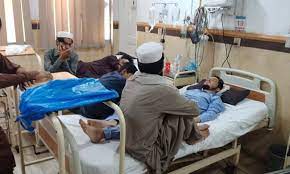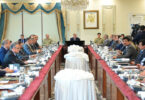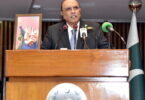F.P. Report
PESHAWAR: Husan Zadgai, a 65-year-old woman was leading a happy life until she was diagnosed with tuberculosis (TB) disease that made her life painful and miserable for long. Hailing from Pabbi, Nowshera district, the senior citizen recalled that she had been coughing from her childhood but the disease got aggravated with every passing year as it was treated as a seasonal cough with flu.
The patient said her TB was diagnosed at the final stage after she was hospitalized due to continued coughing, loss of weight & appetite and shortness of breath. “I was busy at breakfast with my family when suddenly I became unconscious after falling on the ground from the chair,” she said with sobbing eyes after recovery.
“I have passed through different tests at Hayatabad Medical Complex (HMC), Peshawar where I was diagnosed with last stage of TB that had increased the size of heart due to accumulation of substantial fluids,” she said, adding her pericardial effusion surgery was conducted for extracting fluids from lungs.
Later, she was referred to the Lady Reading Hospital Peshawar for further treatment of cardiothoracic surgery due to lack of such facilities at Hayatabad Medical Complex, Peshawar, which exposed PTI tall claims. Husan Zadagai has spent all the amount saved for dowry of her daughter on her long treatment and would have died if she had not spent money for her treatment.
Like Husan Zadagai hundreds of people become victims of communicable TB disease every year in KP that put the public sector hospitals overburdened due to lack of TB hospitals in the province where PTI ruled for nearly 10 years. The KP Health Department report has revealed that in 2019, tuberculosis cases were detected in 158 patients out of one lakh population in Khyber Pakthunkhwa.
Similarly, the multi drug resistance (MDR) cases (incidence rate) were recorded as 9.18 out of 100,000 people. The total notified cases in KP were registered as 41,129 while 4,413 cases were detected in the newly merged districts (Ex Fata). In Khyber Pakthunkhwa, the case detection rate was 48 percent while 32 percent in newly merged areas in 2019 during PTI tenure.
“The findings of the Health Department report published by the PTI government itself were alarming. It showed PTI’s poor policies and ineffective health reforms, which failed to eradicate fatal TB disease besides lessen patients’ problems,” said Ikhtair Wali, PMLN KP spokesman while talking to APP on Thursday.
Instead of focusing on construction of new TB, cancer and general hospitals in KP, he said that PTI had wasted nearly 10 years of people where poor patients have to wait for long to get treatment under Sehat Card. The PTI rulers had neither made fully functional the regional health directorates for speedy resolution of issues of employees of public sector hospitals nor improved healthcare services in districts.
He deplored the former PTI government for not fully implementing the medical teaching institutions (MTI) reforms act 2015 in all public sector hospitals due to which the healthcare service delivery was badly affected. The shortage of staff in the sehat card program, delay in release of funds by the previous government and lack of kidney and liver transplantation services besides non-inclusion of TB treatment were causing enormous problems for poor patients of KP who visited Islamabad and Lahore for treatment.
“Like Cancer, TB was a fatal disease, which could prove fatal if untreated timely,” said senior medical specialist at government hospital Pabbi Nowshera, Sirzameen Khan. He said that about one-third of the world population was infected with TB, having a 5-10% risk of developing TB throughout their lifetime. “TB was not only a biomedical but a socioeconomic phenomenon coupled with social stigma and necessitated the urge for a multi-sectoral framework to address all the possible determinants that can influence TB prevention and treatment.” In Khyber Pakthunkhwa, the burden of non-communicable diseases which was 32.6pc (16,050 disability adjusted life years (DALYs) lost per one lac population) of the total burden in 2000, has increased its share to 39.5pc (15,457 DALYs lost per 100,000 population) in 2019.
However, the burden of the communicable, maternal, child and nutritional group, which was 63 percent (31,130 DALYs lost per one lakh population) in 2000 has gone down to 55.1per cent (21,537 DALYs lost per 100,000 population) in 2019. According to officials’ sources, approximately Rs10 billion sehat card Program (SCP) payments to the hospitals were outstanding on part of the State Life Insurance Company (SLIC) and the government had to release Rs 4 billion to the insurance company every month to clear the backlog and keep the program running.
Riaz Tanoli, chief executive officer, SCP said that the government pays Rs2.5 billion per month to SLIC to bear the expenses under the program while the insurance company retains Rs 1.5 billion from the amount in lieu of the liabilities and pays rest to the hospitals. He said that Rs 30 billion per year was required for smooth functioning of the SCP. The patients suffering from communicable and non communicable diseases were being provided free of charge treatment under the program in the province where Rs30 billion were spent on treatment of around 9.7 million families in its second phase, he said.
In the first phase, he said SCP was launched in Kohat, Mardan, Malakand and Chitral districts wherein 1.8 million poor households were entitled to get up to Rs 540,000 free treatment. In the first phase, he said that 2.3 million people availed the facility and Rs 6 billion were spent on their treatment. In February 2019, he said the program was extended to across the country including all districts of Khyber Pakhtunkhwa in its second phase with a target to provide free treatment including surgeries and medicines up to Rs one million to each family of over 80 million people at 1,000 designated hospitals. In-spite of the change of government in KP, he said the program continued unaffected, adding the caretaker government has recently released Rs 4 billion to the program. Dr Raiz Tanoli said Rs 48,772 million was spent on treatment of 1,977,455 patients from January 2016 to December, 2022. (APP)







